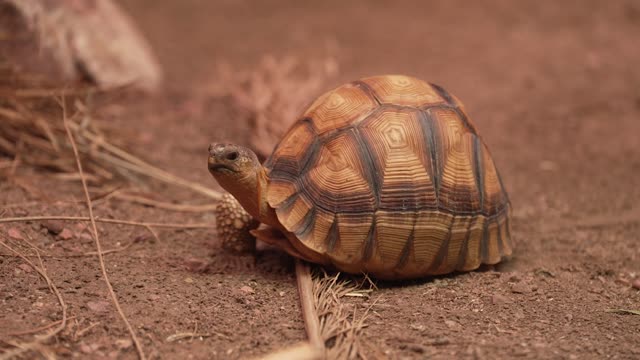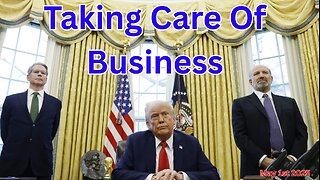Premium Only Content

Three-legged tortoise rescued from smugglers now rolls around on deodorant-style prosthetic limb
A three-legged tortoise which was rescued from smugglers has been given a new lease of life by a zoo after being fitted with WHEELS to help him get around.
The critically endangered ploughshare tortoise, which is rarest tortoise on Earth, was seized from illegal smugglers in Hong Kong in 2019.
The male, named Hope, was given a new home at Chester Zoo where he was fitted with roll-on deodorant-style prosthetic rollers to help with his mobility.
It is now hoped the tortoise will help save its species from extinction in their native Madagascar where fewer than 300 remain.
They are said to be among the most threatened animals on the planet due to being poached by illegal wildlife traders.
Hope was discovered by customers officials in a suitcase with 57 endangered tortoises when travelling from the Comoro Islands off the coast of East Africa.
The illegal trafficker was subsequently jailed for two years, the heaviest penalty ever imposed under Hong Kong’s animal protection laws at the time.
Hope was found to be missing his front left leg, as well as claws on his hind left leg, and three specially-made support rollers were fitted under its lower shell.
Chester Zoo vets have now modified his transportation which now sees him move around faster than any other tortoises in his enclosure.
Dr Gerardo Garcia, curator of lower vertebrates and invertebrates at Chester Zoo, said: “Hope is an incredibly special tortoise, for many reasons.
“Firstly, ploughshare tortoises are exceptionally rare.
"It’s not just the world’s most threatened species of tortoise, it’s one of the most threatened animals on the planet, full stop.
"Fewer than 300 now remain in the wild, mostly due to their overexploitation by illegal wildlife traders – leaving them functionally extinct in their home of Madagascar.
Highly prized for their distinctive gold and black shells, they fetch exceptionally high prices on the illegal, international black market - a result of their ever-increasing rarity.
The illegal wildlife trade is worth £14 billion a year and is the fourth largest international crime after drugs, arms and human trafficking.
-
 1:32
1:32
SWNS
14 days agoEco guilt strikes most Americans four times a month
202 -
 LIVE
LIVE
Major League Fishing
2 days agoLIVE! - Bass Pro Tour: Stage 4 - Day 1
819 watching -
 LIVE
LIVE
2 MIKES LIVE
1 hour agoTHE MIKE SCHWARTZ SHOW with DR. MICHAEL J SCHWARTZ 05-01-2025
121 watching -
 59:38
59:38
BEK TV
8 hours agoMedical Mysteries Revealed. What Mel Gibson and Joe Rogan were Afraid to Say Out Loud
1.32K -
 LIVE
LIVE
Wendy Bell Radio
5 hours agoTaking Care Of Business
8,931 watching -
 1:18:07
1:18:07
JULIE GREEN MINISTRIES
3 hours agoLIVE WITH JULIE
106K157 -
 1:59:13
1:59:13
BEK TV
16 hours agoTrent Loos in the Morning 5/1/2025
45.5K -
 24:00
24:00
JasminLaine
17 hours agoRoom Goes DEAD SILENT After Trump’s Message to Canada—Liberal Voters STUNNED
29.4K57 -
 19:45
19:45
Neil McCoy-Ward
21 hours ago⚠️ “Massive Cyber Attack Hits Supermarkets” - Food Shortages In Stores Already
32.5K14 -
 4:18
4:18
DropItLikeItsScott
19 hours ago $2.58 earnedThe Guns From: The Accountant 2, John Wick, and The Ballerina!
32.7K2